by Knut Jul Meland, Advisor of communication Department of Communication, University of South-Eastern Norway.
During the long Norwegian days and short nights of June 17-19, the USN Drammen campus was transformed into an EDUC hub for meetings, parallel sessions, workshops, and networking, alongside a social and cultural program that also included a taste of Norwegian outdoor life, when USN was hosting the 40th meeting of the Steering committee of the European university alliance EDUC.
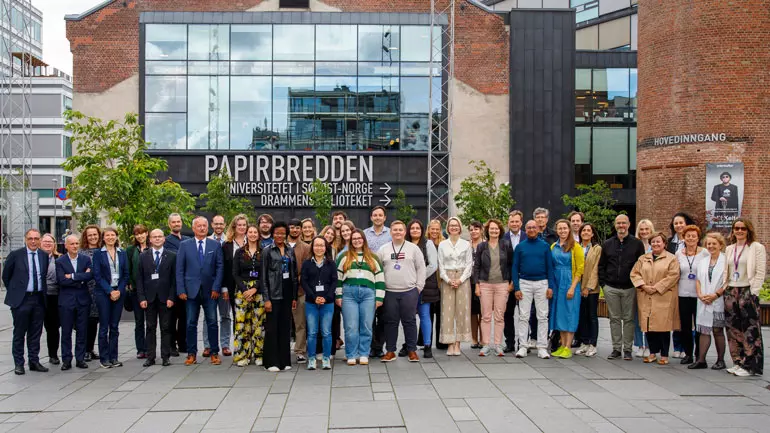
Community engagement was a central theme woven throughout all three days in June. The steering committee is a crucial part of the governance structure of the European Digital UniverCity alliance. Meetings are bringing together leadership, students, administration, faculty, and experts from various disciplines and all EDUC universities—face to face.
– Creating a lively, interconnected community focused on excellence in education and societal impact was the heart of our steering committee meeting in Drammen. We leveraged the unique strengths of each partner university to foster dynamic discussions and develop innovative solutions to the challenges we face. This commitment to collaboration reflects the ethos of EDUC and strengthens our shared mission, said Britta van Kempen, vice-rector of international relations at the University of Potsdam, and head of EDUC. The meeting included visiting delegations from the universities of Potsdam, Cagliari, Pécs, Paris Nanterre, Rennes, Masaryk University, Jaume I University, and their Norwegian colleagues, as well as the warmly welcomed Vasyl Stefanyk Precarpathian National University (PNU) from Ukraine.
Through the Horizon Europe-funded project EDUC-WIDE, the university alliance has introduced the Ukrainian Vasyl Stefanyk Precarpathian National University (PNU) as an associated member of the family and established solid research and innovation connections (R&I) with the European Research Area (ERA).
Synergies of regional collaboration
USN-rector dr. Pia Bing-Jonsson presented USN’s main profile as vocationally and work-sector-oriented when she welcomed the delegations to the Drammen campus, located in Papirbredden: a modern and dynamic area in Drammen housing a combination of businesses, academia, and other public services.
- USN aims to provide students with education of high social relevance, thus our research and education are characterized by close interaction with the regional community and workforce,” said Bing-Jonsson before introducing keynote speaker: Drammen’s municipal director, Trude Andersen.
The municipal director provided insights into the synergies of regional collaboration, ecosystems, and community engagement as she set the tone further by engaging the crowd with her approach to the importance of close and strategic collaboration with the university. The audience resonated with the challenges Drammen municipality must address in the coming years and were inspired by stories of how municipal services are improved through access to up-to-date research and how research becomes more relevant through close contact with the field of practice.
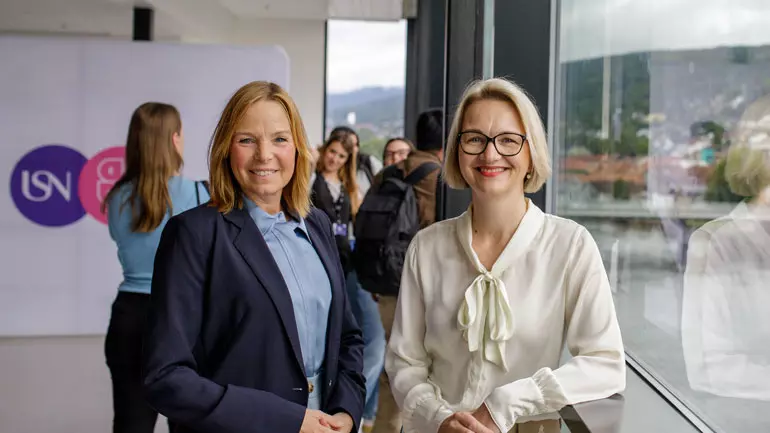
Outdoor Life, of Course
Since the meeting was hosted in Norway, there had to be some outdoor life! The Drammen campus is one of, if not the most, urban among USN’s eight campuses. Despite being based in the city center, it is still flanked by impressive natural surroundings. The campus is located right by the Drammen River, a major waterway providing a tranquil and scenic backdrop for the university. Beyond the river, the campus is also near Finnemarka, a large forest area rich in untouched natural beauty.
Åspaviljongen, a picturesque gateway to this popular outdoor area, served as the destination for the hike from campus to this elevated restaurant with views over the city and green surroundings.
The peaceful riverside environment also served as the setting for refreshing Walk and Talk sessions.
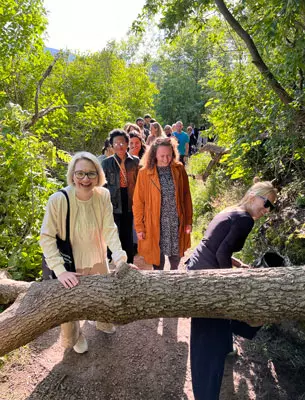
A look into the future
EDUC’s rector council was gathered to look beyond the current funding period to discuss the future of EDUC after 2026. In a mix of themes, the council managed to find ways forward regarding the goal of transforming institutional structures to implement EDUC, as consensus was reached on future legal status choices.
Outreach was also on the Rectors’ meeting agenda, aiming to strengthen the universities’ engagement with and contributions to the broader community, with activities and initiatives addressing social and cultural issues and promoting the social engagement of the universities. Outreach is further linked to the universities’ social responsibility and how it can be advanced through our actions and collaborations with stakeholders and the wider society.
Some of the discussion topics on community engagement were how the alliance can work to promote extensive networking and collaborative networks, joint projects, and partner and community engagement.
Quality assurance and internationalisation of teacher education
Among other discussion topics was the academic quality assurance of EDUC’s offerings, which is a crucial step in integrating them into local study programs and facilitating the approval of EDUC activities. The importance of the alliance cooperation being based on mutual trust between the partners was emphasized.
Teacher education was another topic, made relevant by the recruitment crisis and much negative publicity. The vice-rectors for education discussed how they could provide their teacher education students with good and positive experiences through relevant international experience.
- It is challenging to facilitate student mobility in program-driven education, such as teacher education. Through EDUC, we can explore new formats and mobility of varying lengths, which can better suit such educational programs, and EDUC partners want to work even more closely together on this going forward,” said Ingvild Marheim Larsen, vice-rector for education at USN.
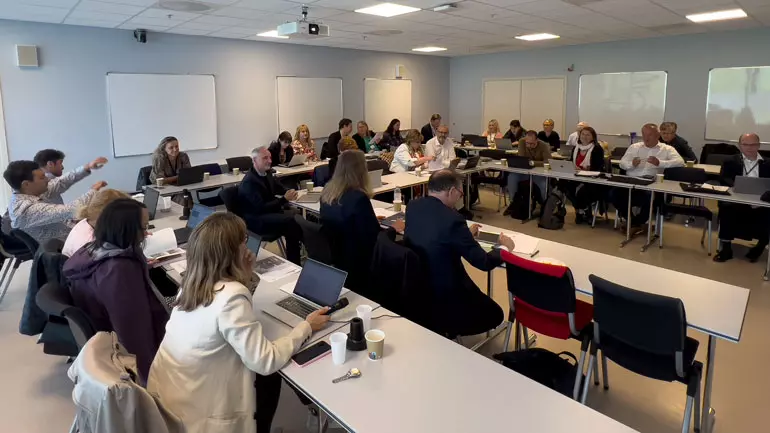
Identifying the Challenges
A good climate for cooperation and communication is crucial for an alliance like EDUC to function across many institutions and countries. A natural element of the SC meetings is therefore Alliance Training Sessions.
This time, the theme was communication and information flow within the alliance. Participants were challenged to map out the alliance structure in all its complexity before identifying where the biggest challenges lay and discussing possible solutions.
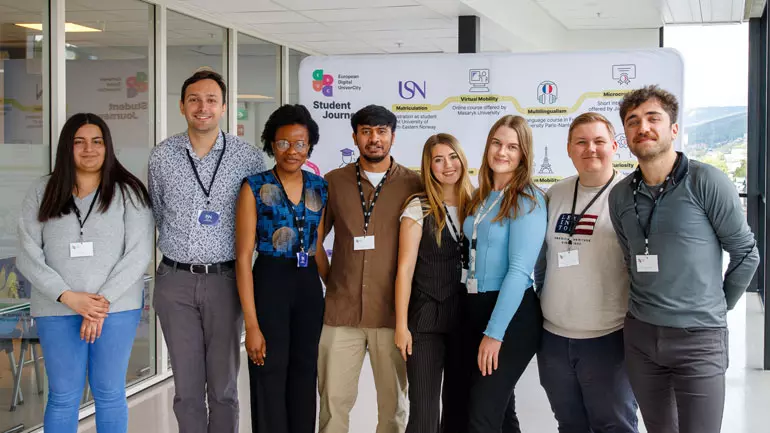
Next Stop: Sardinia
The next EDUC steering committee meeting will take place at the University of Cagliari in Italy, in October 2024. Identified key points for the upcoming meeting are midterm reporting, follow up on alliance training, involvement of teachers, teacher training students, think lab digitalization and introducing the OpenUp platform.
.
.
Photocredit: © Knut Jul Meland, Nils Kalve










